
Nvidia's Strategic Shift: Navigating U.S. Export Rules
Nvidia is making headlines once again as it plans to launch a new AI chip tailored for the Chinese market later this year. Despite the ongoing U.S. export restrictions that have effectively limited its market access in China, the semiconductor giant remains undeterred. According to a report by the Financial Times, this newly developed chip will be based on Nvidia's Blackwell RTX Pro 6000 processor, adjusted to comply with current regulatory requirements.
Understanding the Modifications
This new AI chip promises to be a significant entry into the Chinese tech ecosystem by omitting certain high-end features. Specifically, it will not include high-bandwidth memory or Nvidia's NVLink, which is pivotal for high-speed communication. These modifications suggest that Nvidia is aiming to offer a viable product in a competitive market where local manufacturers like Huawei are currently thriving.
Market Implications and Competitive Landscape
Nvidia's CEO, Jensen Huang, had previously indicated the company's decision to exclude revenue forecasts from the Chinese market, a significant pivot protecting investor interests amidst geopolitical tensions. This strategic move may, however, be reconsidered if the new chip gains traction. China, home to one of the largest developer populations, presents opportunities for Nvidia, particularly in the realm of open-source foundations and non-military AI applications.
The Future: What Lies Ahead?
As Nvidia prepares for this potential launch, the broader implications could reshape the AI chip landscape. With increasing developers creating models for a myriad of applications, the demand for compatible AI technology remains high. If successful, Nvidia's efforts could restore its position in a significant market, influencing future stock valuations, and creating competitive pressure on both U.S. and Chinese firms.
As the situation continues to evolve, stakeholders in the tech industry should stay informed about Nvidia's strategic decisions and how they may impact global AI development.
 Add Row
Add Row  Add
Add 




Write A Comment